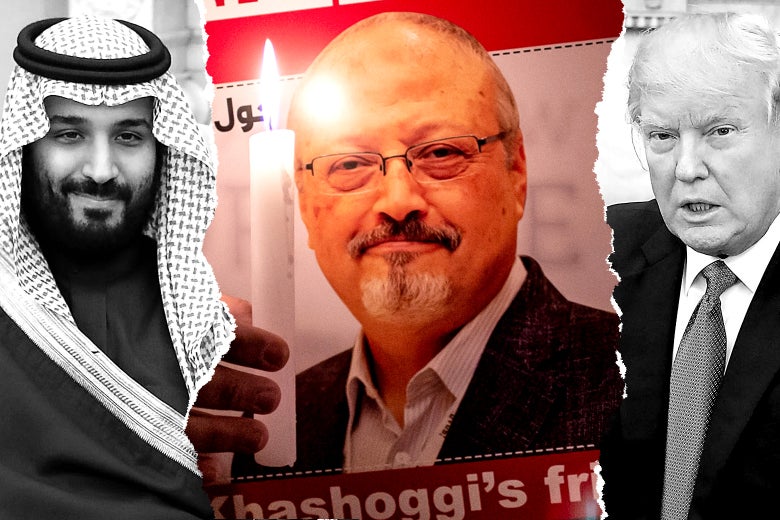
There is almost no mention of it, despite there being days when the case appeared on front pages in the U.S. as well as Europe, especially after the disappearance. This refers to the murder of the journalist Jamal Khashoggi, who entered the buildings of the Saudi Consulate in Istanbul last Oct. 2 and has not been heard from since. Just a few weeks later, with general embarrassment, Riyadh admitted that the reporter living in exile in the U.S., a frequent critic of Crown Prince Mohammed bin Salman, was murdered inside the diplomatic headquarters. Now bringing the case back up is The Washington Post, the daily for which Khashoggi wrote.
US Worried by Mohammed Bin Salman
The general embarrassment of [this event in] October comes above all from the fact that the United States and Saudi Arabia are historical allies. Moreover, since Donald Trump has been the new resident of the White House, relations with Riyadh appear to be closer. Between the president’s son-in-law, Jared Kushner, and the crown prince, a personal friendship has indeed arisen. It is precisely from Washington that unconditional support for Crown Prince Mohammad comes. For three years now he has been appearing more and more like the strong man of the Saudi kingdom. It is he who is at the helm of the country; his elderly father King Salman bin Abdul-Aziz Al Saud Salman is seeming more and more like a mere figurehead. MBS, the acronym by which the crown prince is called, presents himself as a “reformer.” The American press itself has tailor-made a “moderate” image for the Saudi crown prince. Though not the entire press, actually: Khashoggi harshly criticized MBS in his own column in The Washington Post.
And this would in fact have made his brutal death sentence a reality. From the White House, Trump himself hastily says that investigations into the murder are in progress and that, on his part, there is the belief that those who acted in October did so without involving MBS. However, the reality is very different. This is because, as David Ignatius points out in a Washington Post article, we can see that the decision to support the Saudi crown prince in his ascent to power and his vision of the Middle East appears to be an increasingly risky move. It was almost a youthful mistake by Trump’s son-in-law and an error due to the president’s staff’s inexperience. The indictment of 11 suspects aside, internal repression in MBS’s country meanwhile remains unrestrained. This affects opponents accused of corruption and the Shiite minority in Qatif.
In short, nothing has changed since that Oct. 2. Despite MBS being cornered following the discovery of the journalist’s brutal murder, the crown prince is showing one of his traits that some State Department officials had already identified in him in earlier, more innocent times; namely, that MBS only learns from his successes but never from his mistakes. As Ignatius writes, Washington is almost obsessed by the threat of the Saudi scion being a new Saddam, an “authoritarian modernizer” who knows no alliances and acts on his own. In short, the impression of having helped create a difficult character to manage is developing in the buildings of American power. Moreover, relations between the two countries are mutually vital: for the U.S. to sell arms and import oil, and for Saudi Arabia, defense.
The Saudi 007 Unit Trained in the US
But there is another United States element here that is more than a little unsettling. Ignatius highlights this once again in his long article in which he returns to the Khashoggi case. There is indeed clear evidence that the unit that killed the journalist in Istanbul has received support and assistance, as well as training, from the United States. In Washington, Ignatius emphasizes, questions are increasingly being raised as to how the capabilities of U.S.-trained intelligence forces are being used. Particularly in the Washington Post article, the identity of the assassination squad that acted last Oct. 2 in Istanbul has been reconstructed, starting with Maher Mutreb, who for years worked to climb to the top of the Saudi 007s. He did so by making use of privileged relationships with American service members. One of the many illustrations of this comes from the fact that he was the one who accompanied MBS in his travels to the U.S. in 2017 and 2018.
Mutreb would be the one who was placed at the head of the unit assigned to eliminate Khashoggi. Furthermore, Mutreb is described as one of the journalist’s most trusted friends. Perhaps for this reason the victim readily entered the Saudi Consulate, unaware of the fate that would soon strike him. It is an intricate story, which often leads back to parts of Washington. And because of this, in the American capital, someone could increasingly ask questions of Trump’s diplomatic and intelligence advisers.

Leave a Reply
You must be logged in to post a comment.